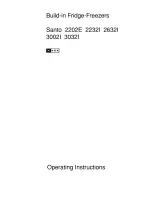
4
1. With a slot screwdriver, remove the plastic caps of the seven compressor cover screws.
2. With a Phillips screwdriver, remove the compressor cover mounting screws. This will allow the
compressor cover to be removed.
1. Using a phillips screwdriver remove the electrical box and then remove thermostat from the
electrical box (located underside, compressor compartment)
2. Remove sealing putty from bottom of capillary sleeve
3. Using two hands, slowly, a little bit at a time, pull thermostat capillary out from sleeve.
Be careful not to bend capillary too sharply to avoid breakage
4. Remove quick disconnects from thermostat terminals as shown and then remove control nut
using a 9/16” nut driver.
5. Re-connect quick disconnects to new thermostat
6. Install thermostat back into the electrical box
7. Carefully with two hands, push thermostat capillary as far as it will go
8. Replace sealing putty at capillary sleeve bottom
9. Re-install electrical box
10. Re-install compressor cover
Quick Disconnect
5
NOTICE:
When removing the compressor cover, be careful not to bend thermostat sensor tube too sharply
to avoid breakage. Breakage will cause the gas from the thermostat sensor tube to escape, and
stop thermostat from functioning.
REMOVE AND REPLACE THE COMPRESSOR COVER
REMOVE AND REPLACE THE THERMOSTAT
CLEANING
WARNING
Make sure unit is disconnected from power supply. Service by a certified technician is recommended.
Failure to follow these instructions can result in death, fire, or electrical shock.
WARNING
Make sure unit is disconnected from power supply. Service by a certified technician is recom-
mended. Failure to follow these instructions can result in death, fire, or electrical shock.
GENERAL
The unit should be cleaned at regular intervals to meet a good standard of hygiene, and
to keep the unit attractive as an effective point of purchase display.
INTERIOR CLEANING
Use only mild non-abrasive liquid cleaner, water and a soft cloth.
The entire unit interior can be cleaned. Make sure to wipe off all residue.
EXTERIOR CLEANING
Use only mild non-abrasive liquid cleaner, water and a soft cloth for the painted surfaces
and a stainless steel polish and cleaner for the stainless steel surfaces if desired.
CLEANING GLASS
Due to the special coating on the glass, use only a mild, non-abrasive liquid cleaner, water,
and a soft cloth. Same applies to the plastic door frame.
MAINTENANCE
No regular maintenance other than cleaning and defrosting is required.
WARNING
To reduce the risk of fire, electrical shock or personal injury, disconnect the unit from the power
source before cleaning. Keep liquids away from electrical and electronic components.
To clean the exterior whether it has the original finish or a decal package, use only a mild non-abra-
sive liquid cleaner, water and a soft cloth. Always apply the cleaner to the soft cloth and then clean
the unit. Never apply the cleaner directly to the unit. Excess liquid applied to the surface may seep into
the electronic control and switches which can cause an electrical hazard or a malfunction.
DO NOT USE abrasive or caustic cleaners, scouring pads, solvents or flammable liquids.
CAUTION
Do not apply hot water on cold glass components. Allow glass to warm sufficiently to prevent
shattering.
CAUTION
Do not use ammonia or bleach based cleaners or abrasive type cleaners.
Do not use abrasive cleaning pads.
























